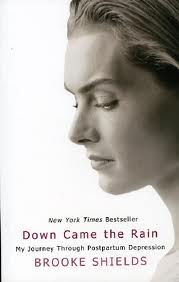The beautiful, educated, sophisticated, talented actress Brooke Shields had a baby she’d longed for with the husband of her dreams who adored her. She looked at her daughter and didn’t know her, didn’t connect, didn’t love her. She began to cry. She cried for days, for weeks. She wanted to run away. She saw her baby flying through the air and hitting the wall. Over and over again.
This is post-partum depression. In Down Came the Rain (Hyperion, 2006) Ms. Shields gives it to us raw, weeping, and believable.
I didn’t need to be convinced this is a real thing. I’ve been there twice: once after an adoption, once after childbirth. I didn’t feel disconnected or unloving toward my babies, but I cried constantly. In torrents. Inconsolably. For weeks. Couldn’t function. Couldn’t see a happy future.
Post-partum depression is different from the milder “Baby Blues” and less terrifying than all-out post-partum psychosis where women kill their newborns or themselves or both.
I continually hear nonsense like “there’s no such thing as mental illness” and “this sort of thing is a sin problem” and “just get over it.”
This is not only foolish talking, but it is dangerous talking. You try having your belly sliced open to retrieve an eight-pound infant. Add a little hemorrhaging. Flood your body with hormones. Light your breasts on fire with mastitis. Toss in a couple of weeks of zero sleep. Thud around on elephant legs. Try to go to the bathroom without assistance (because being sliced open with scalpels hurts), while bleeding like a fountain (with clots, soaking an endless succession of those giant mega-maxi-post-childbirth pads/diapers). Mix in a few relatives-with-expectations who wonder why you’re not up to going out yet, and you might go a little nutso too and wonder who that thing is that’s lying there all crying and wanting to suck on you when you just want to have someone brush your hair, sing you to sleep real deep so you don’t have to wake up for a long long time.
This is an illness. It is frightening. Some people don’t survive it.
Saying this is “not real” is like slamming your arm in the car door and having someone tell you that throbbing is just your sin talking. “Take it to the Lord; trust Him.”
Sure, but take it to the doctor, and right now.
There are meds for this, and they can be helpful. One of the problems is that the suffering woman can’t think clearly enough to call the doc, and the husband is often so stunned by his wife’s lack of love for (or even aversion to) his precious baby that he doesn’t know what to do either. Here is what to do: Call the doctor. If it’s scary (she’s threatening to hurt herself or the baby), call 911.
I would recommend Down Came the Rain to anyone who is expecting. Even though you have a perfect pregnancy (Brooke did), and are looking forward to this baby with all your heart (Brooke was), you do not know how your body will respond. You cannot regulate your hormones by force of will. Your husband is not more savvy than Chris Henchy, Brooke’s husband, who is a Hollywood screenwriter and producer and who is smart enough to get Brooke Shields to marry him. He didn’t know what to do when the Bad Times hit, and your husband might not either. Fortify yourselves by reading up. Just in case. Even if you are fine and adore your baby, you will have the understanding to help a friend–to see that your friend needs help.
Happily, Brooke came through it with good medical care, a little help around the house, and a loving family. She and Chris had another daughter two years later, a situation she describes as “nothing but bliss.”


